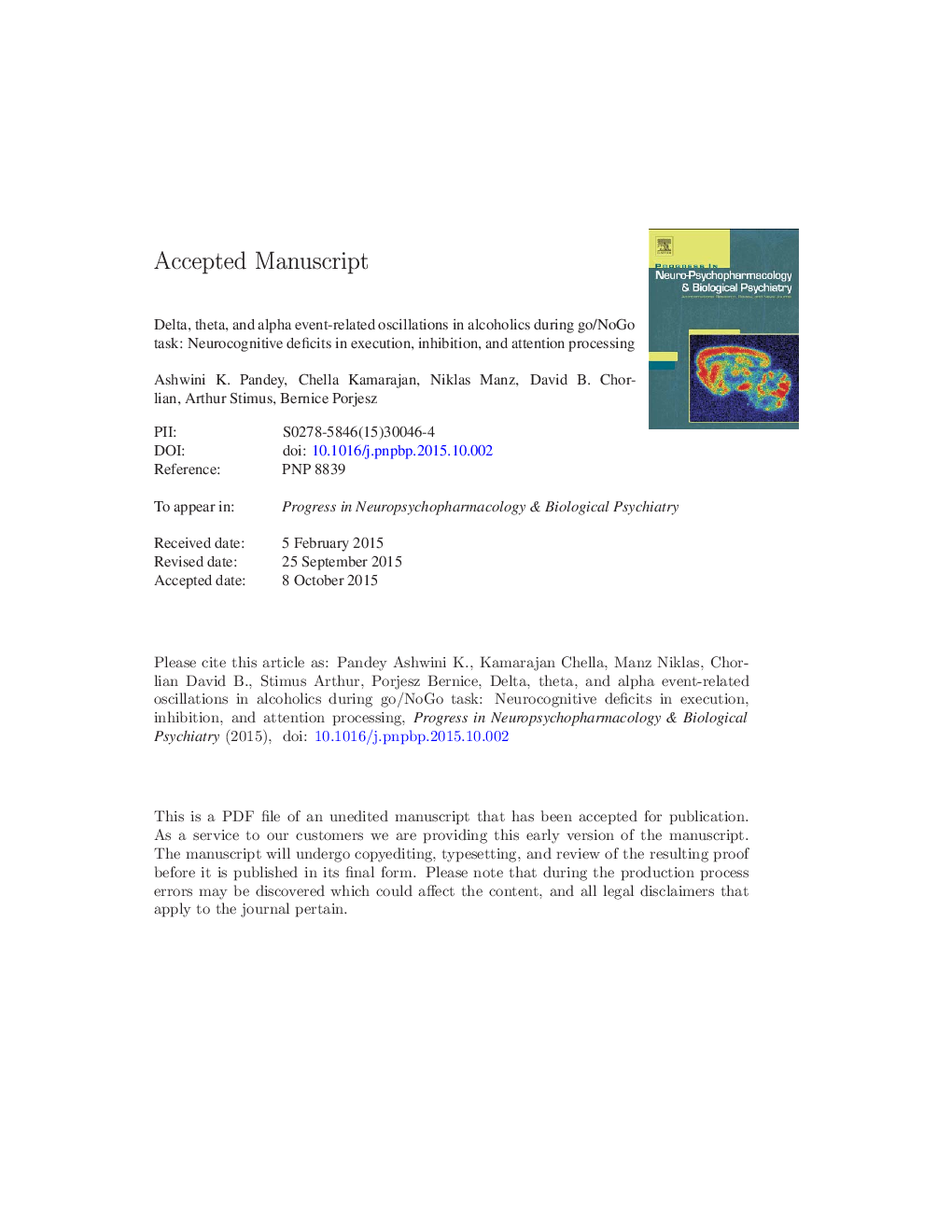| کد مقاله | کد نشریه | سال انتشار | مقاله انگلیسی | نسخه تمام متن |
|---|---|---|---|---|
| 5844218 | 1561029 | 2016 | 56 صفحه PDF | دانلود رایگان |
عنوان انگلیسی مقاله ISI
Delta, theta, and alpha event-related oscillations in alcoholics during Go/NoGo task: Neurocognitive deficits in execution, inhibition, and attention processing
دانلود مقاله + سفارش ترجمه
دانلود مقاله ISI انگلیسی
رایگان برای ایرانیان
کلمات کلیدی
موضوعات مرتبط
علوم زیستی و بیوفناوری
علم عصب شناسی
روانپزشکی بیولوژیکی
پیش نمایش صفحه اول مقاله

چکیده انگلیسی
Higher impulsivity observed in alcoholics is thought to be due to neurocognitive functional deficits involving impaired inhibition in several brain regions and/or neuronal circuits. Event-related oscillations (EROs) offer time-frequency measure of brain rhythms during perceptual and cognitive processing, which provide a detailed view of neuroelectric oscillatory responses to external/internal events. The present study examines evoked power (temporally locked to events) of oscillatory brain signals in alcoholics during an equal probability Go/NoGo task, assessing their functional relevance in execution and inhibition of a motor response. The current study hypothesized that increases in the power of slow frequency bands and their topographical distribution is associated with tasks that have increased cognitive demands, such as the execution and inhibition of a motor response. Therefore, it is hypothesized that alcoholics would show lower spectral power in their topographical densities compared to controls. The sample consisted of 20 right-handed abstinent alcoholic males and 20 age and gender-matched healthy controls. Evoked delta (1.0-3.5Â Hz; 200-600Â ms), theta (4.0-7.5Â Hz; 200-400Â ms), slow alpha (8.0-9.5Â Hz; 200-300Â ms), and fast alpha (10.0-12.5Â Hz; 100-200Â ms) ERO power were compared across group and task conditions. Compared to controls, alcoholics had higher impulsiveness scores on the Barrett Impulsiveness Scale (BIS-11) and made more errors on Go trials. Alcoholics showed significantly lower evoked delta, theta, and slow alpha power compared to controls for both Go and NoGo task conditions, and lower evoked fast alpha power compared to controls for only the NoGo condition. The results confirm previous findings and are suggestive of neurocognitive deficits while executing and suppressing a motor response. Based on findings in the alpha frequency ranges, it is further suggested that the inhibitory processing impairments in alcoholics may arise from inadequate early attentional processing with respect to the stimulus related aspects/semantic memory processes, which may be reflected in lower posterio-temporal evoked fast alpha power. It can thus be concluded that alcoholics show neurocognitive deficits in both execution and suppression of a motor response and inadequate early attentional processing with respect to the semantic memory/stimulus related aspects while suppressing a motor response.
ناشر
Database: Elsevier - ScienceDirect (ساینس دایرکت)
Journal: Progress in Neuro-Psychopharmacology and Biological Psychiatry - Volume 65, 4 February 2016, Pages 158-171
Journal: Progress in Neuro-Psychopharmacology and Biological Psychiatry - Volume 65, 4 February 2016, Pages 158-171
نویسندگان
Ashwini K. Pandey, Chella Kamarajan, Niklas Manz, David B. Chorlian, Arthur Stimus, Bernice Porjesz,